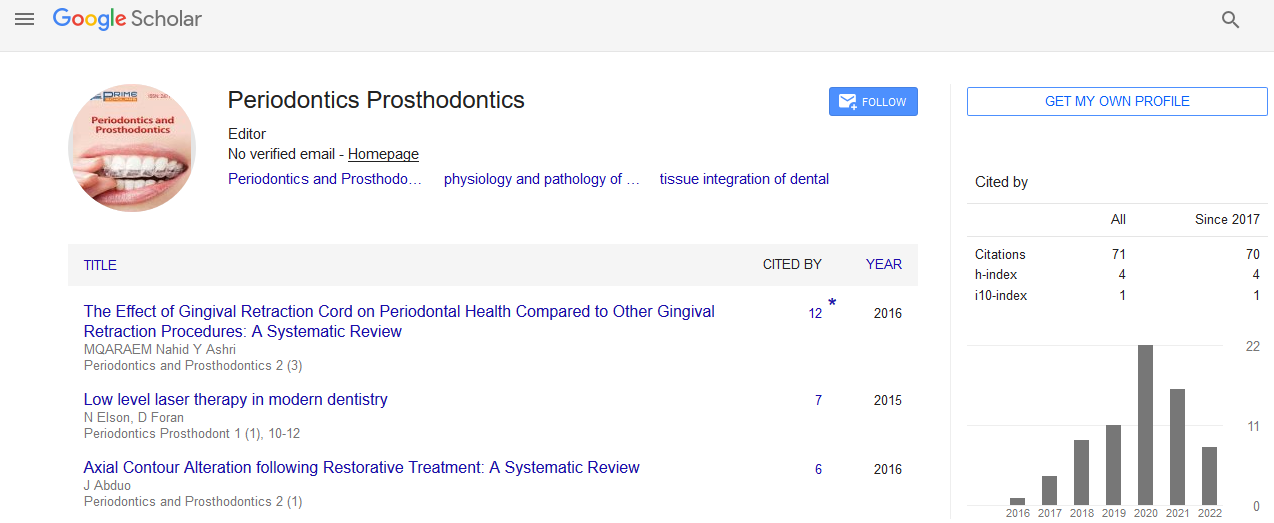Short Communication - (2024) Volume 10, Issue 2
The Role of Systemic Health in Periodontal Disease Management
Liam Thompson*
Department of Periodontology, University of Melbourne, Australia
*Correspondence:
Liam Thompson,
Department of Periodontology, University of Melbourne,
Australia,
Email:
Received: 29-May-2024, Manuscript No. IPPDPD-24-20876;
Editor assigned: 31-May-2024, Pre QC No. IPPDPD-24-20876 (PQ);
Reviewed: 14-Jun-2024, QC No. IPPDPD-24-20876;
Revised: 19-Jun-2024, Manuscript No. IPPDPD-24-20876 (R);
Published:
26-Jun-2024, DOI: 10.36648/2471-3082.24.10.20
Introduction
The management of periodontal disease extends beyond oral
care, involving a complex interplay between systemic health
and periodontal status. Systemic conditions such as diabetes,
cardiovascular disease, and autoimmune disorders can
significantly impact the severity and progression of periodontal
disease. Understanding these interactions is crucial for developing
effective treatment plans and improving patient outcomes. This
article explores the influence of systemic health on periodontal
disease management and highlights the importance of a holistic
approach to dental care. Periodontal disease is a multifactorial
condition characterized by inflammation of the gums and
supporting structures of the teeth. It is primarily caused by the
accumulation of bacterial plaque, which triggers an inflammatory
response in the periodontal tissues. While local factors, such
as oral hygiene practices and plaque control, play a significant
role in the development of periodontal disease, systemic health
conditions can exacerbate or complicate the disease process
[1,2].
Description
Diabetes mellitus is one of the well-documented systemic
conditions affecting periodontal health. Individuals with poorly
controlled diabetes are at an increased risk of developing
periodontal disease due to impaired wound healing and altered
immune responses. Hyperglycaemia contributes to the growth
of pathogenic bacteria in the oral cavity and can accelerate
periodontal tissue destruction. Managing periodontal disease in
diabetic patients requires a coordinated approach that includes
glycaemic control and regular periodontal care to prevent disease
progression. Cardiovascular disease is another systemic condition
that has been linked to periodontal health. Research suggests
that periodontal disease may be associated with an increased risk
of cardiovascular events, such as heart attacks and strokes. The
inflammatory mediators released during periodontal disease can
enter the bloodstream and contribute to systemic inflammation,
potentially impacting cardiovascular health. Therefore, managing
periodontal disease in patients with cardiovascular conditions
involves addressing both oral and systemic factors to reduce
the risk of adverse outcomes. Autoimmune disorders, such as
rheumatoid arthritis and systemic lupus erythematous, can
also affect periodontal health. These conditions often involve
systemic inflammation and altered immune responses that
can exacerbate periodontal tissue destruction. Patients with
autoimmune disorders may experience more severe periodontal
disease and may require specialized care to manage their oral
health effectively. Collaboration between dental and medical
professionals is essential for providing comprehensive care that
addresses both systemic and periodontal issues. Additionally,
conditions such as osteoporosis and certain medications,
including corticosteroids and antihypertensive, can influence
periodontal health. Osteoporosis can lead to bone loss in the
jaw, which may affect the stability of teeth and exacerbate
periodontal disease. Medications can alter oral health by causing
xerostomia (dry mouth) or affecting the healing process. Regular
monitoring and adjustments to treatment plans are necessary to
manage these systemic factors effectively. A holistic approach to
periodontal disease management involves integrating systemic
health considerations into the treatment plan. This approach
includes thorough medical history taking, collaboration with
other healthcare providers, and patient education on the impact
of systemic conditions on oral health [3,4]. By addressing both
local and systemic factors, dental professionals can develop
personalized treatment plans that optimize periodontal health
and overall well-being.
Conclusion
Systemic health plays a pivotal role in the management of
periodontal disease, influencing the severity and progression of
the condition. Understanding the interplay between systemic
conditions and periodontal health is essential for providing
comprehensive care and improving patient outcomes. By
adopting a holistic approach that integrates systemic health
considerations, dental professionals can enhance the effectiveness of periodontal treatments and contribute to better overall health
for their patients. Continued research and collaboration between
dental and medical fields will further advance our understanding
of these complex interactions and support the development of
more effective management strategies.
Acknowledgement
None.
Conflict Of Interest
The author’s declared that they have no conflict of interest.
References
- Ogunbode AM, Ladipo MMA, Ajayi IO, Fatiregun AA (2011) Obesity: An emerging disease. Niger J Clin Pract 1:390-394.
[Crossref] [Google Scholar]
- Murugan AT, Sharma G (2008) Obesity and respiratory diseases. Int J Gen Med. 5:233-242.
[Crossref] [Google Scholar]
- Renehan AG, Tyson M, Egger M, Heller RF, Zwahlen M (2008) Body-mass index and incidence of cancer: A systematic review and meta-analysis of prospective observational studies. Lancet 371:569-578.
[Crossref] [Google Scholar]
- Huxley RR, Moghaddam AA, Clifton P, Czernichow S, Parr CL, et al. (2009) The impact of dietary and lifestyle risk factors on risk of colorectal cancer: A quantitative overview of the epidemiological evidence. Int J Cancer 125: 171-180.
[Crossref] [Google Scholar]
Citation: Thompson L (2024) The Role of Systemic Health in Periodontal Disease Management. Periodon Prosthodon. 10:20.
Copyright: © 2024 Thompson L. This is an open-access article distributed under the terms of the Creative Commons Attribution License, which permits unrestricted use, distribution, and reproduction in any medium, provided the original author and source are credited.

